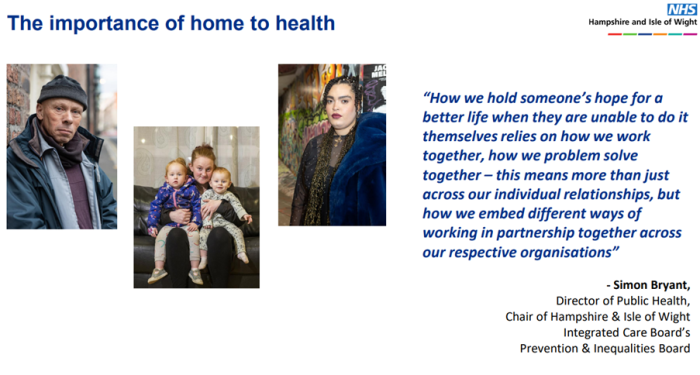 If we lose our home, our homelessness affects everything. It is not simply house-lessness. Homelessness breaks our roots, ties to a place, our self-esteem, sense of belonging, a sense of spiralling loss – removing our ability to cook, sleep, self-care - affecting our safety/security – for some that spiralling loss happens over and over again. Quite simply without a home, nothing can fall into place.
If we lose our home, our homelessness affects everything. It is not simply house-lessness. Homelessness breaks our roots, ties to a place, our self-esteem, sense of belonging, a sense of spiralling loss – removing our ability to cook, sleep, self-care - affecting our safety/security – for some that spiralling loss happens over and over again. Quite simply without a home, nothing can fall into place.
Some people can experience significant life challenges and/or trauma, compromising their ability to lead fulfilling lives or sustain healthy relationships, their home and work. Others fall into cycles of homelessness, mental ill health, inpatient stays and imprisonment. Their physical and mental health can be compromised by co-occurring drug and alcohol misuse. They often experience entrenched poverty, periods of rough sleeping, long term ill health/disability and hunger.
People can face stigma/discrimination when others make assumptions referring to homelessness as someone’s “life choice” – they forget to see the person, they just see someone who ticks too many boxes – use service thresholds as a barrier to support – too complex, too complicated, too risky. In short, homelessness can be devastating, dangerous and isolating and its impacts make it a health issue.
What do we know about the health of people experiencing homelessness?
- Across HIOW, homelessness is up 12% (March 2023) on the previous year, with the number of people sleeping rough increasing by 21% in the same period.
- Half of all homelessness across the HIOW footprint occurs in Hampshire (49%), with high concentrations of homelessness evident in cities (March 2023).
- That means that around 1 in every 90 households we come into contact with experience some form of housing insecurity/homelessness.
- Average age is 37 years old locally - average age of death whilst homeless 43 years for women, 45 years for men (nationally).
- Over the last 10 years, a minimum of 107 people died whilst homeless – from mainly treatable causes (TB, gastric ulcers, strokes, cardiovascular disease etc), with some struggling to engage with services as designed.
We also know from national data that people experiencing homelessness:
- 34 x times more like to have TB
- 50 x more likely to have HepC
- 23 x more likely to have epilepsy
- 6 x more likely to have heart disease
- 5 x more like to have a stroke
- 2.5 x more like to have asthma
- Attend ED 6 x times as often
- Admitted to hospital 4 x times as often
- Stay 3 x times as long than the general population
Therefore, reducing and preventing homelessness and its impacts also protects the NHS:
- Reduces ED activity – 26% reduction in A&E attendances
- Less emergency admissions – 41% reduction in emergency admissions
- Reduces length of stay – 43% reduction in bed days
- Reduces delayed transfers of care (DTOC), aids discharge, reduces readmissions = improves flow
- Less elective care tipping into urgent care
- Prevents people being discharged No Fixed Abode (NFA)
- Reduces health inequality, frequent presentations, easing winter pressures.
Rough Sleeping
The most visible and dangerous form of homelessness. This includes sleeping outside or in places that aren't designed for people to live in e.g., cars, doorways and abandoned buildings.
Statutory Homelessness
Local authorities have a duty to secure a home for some groups of people. To be legally defined as homeless you must lack a secure place in which you are entitled to live or not reasonably able to stay. In order to receive assistance under the main homelessness duty, there is further criteria you have to meet. Local authorities may then provide temporary accommodation to households who might meet these criteria, mainly families with children.
Hidden Homelessness
Those who may not be entitled to help with housing, or those who do not approach the local authority for help, are not often counted in the official statistics. Many stay in hostels, squats, B&Bs, overcrowded accommodation or concealed housing e.g., floors or sofas of friends and family.
At Risk of Homlessness
Some people are at a higher risk of homelessness that others. Those in low paid jobs, living in poverty and poor quality or insecure housing are more likely to experience homelessness.
Find out more here: Types of homelessness - Crisis